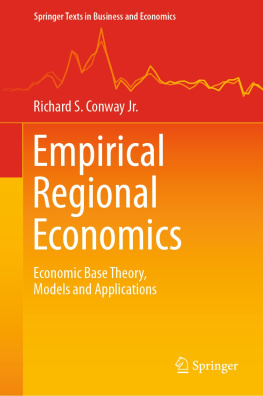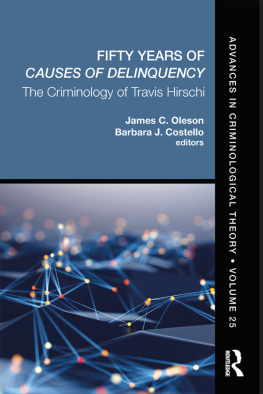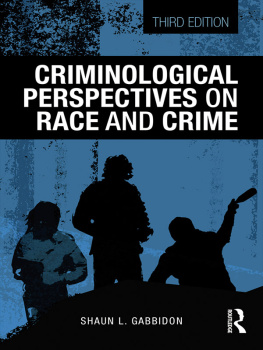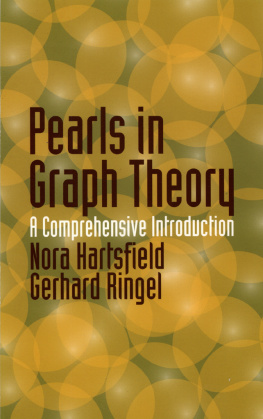LABELING THEORY
EDITORS
Freda Adler
University of Pennsylvania
William S. Laufer
University of Pennsylvania
EDITORIAL BOARD
Advances in Criminological Theory
Robert Agnew
Emory University
Ko-Lin Chin
Rutgers University
Albert K. Cohen
University of Connecticut
Francis T. Cullen
University of Cincinnati
Delbert S. Elliott
University of Colorado
David P. Farrington
Cambridge University
James O. Finckenauer
Rutgers University
John H. Laub
National Institute of Justice
John MacDonald
University of Pennsylvania
Terrie E. Moffit
Duke University
Joan Petersillia
Stanford University
Robert J. Sampson
Harvard University
Kip Schlegel
Indiana University
Lawrence W. Sherman
University of Maryland
David Weisburd
Hebrew University
George Mason University
Elmar G. M. Weitekamp
University of Tubingen
William Julius Wilson
Harvard University
LABELING THEORY
Empirical Tests
Advances in Criminological Theory
volume 18
David P. Farrington
Joseph Murray
editors
First published 2014 by Transaction Publishers
Published 2017 by Routledge
2 Park Square, Milton Park, Abingdon, Oxon OX14 4RN
711 Third Avenue, New York, NY 10017, USA
Routledge is an imprint of the Taylor & Francis Group, an informa business
Copyright 2014 by Taylor & Francis.
All rights reserved. No part of this book may be reprinted or reproduced or utilised in any form or by any electronic, mechanical, or other means, now known or hereafter invented, including photocopying and recording, or in any information storage or retrieval system, without permission in writing from the publishers.
Notice:
Product or corporate names may be trademarks or registered trademarks, and are used only for identification and explanation without intent to infringe.
Library of Congress Catalog Number: 2013012464
Library of Congress Cataloging-in-Publication Data
Labeling theory : empirical tests / David P. Farrington and Joseph Murray, editors.
pages cm. (Advances in criminological theory ; volume 18)
Includes bibliographical references and index.
ISBN 978-1-4128-4246-4
1. Criminology. 2. Deviant behaviorLabeling theory. 3. Criminal behavior. I. Farrington, David P.
HV6025.L23 2013
364.3dc23
2013012464
ISBN 13: 978-1-4128-4246-4 (hbk)
Contents
David P. Farrington and Joseph Murray
Ross L. Matsueda
Fred E. Markowitz
Francis T. Cullen and Cheryl Lero Jonson
Kelle Barrick
Anthony Petrosino, Carolyn Turpin-Petrosino, and Sarah Guckenburg
Lawrence W. Sherman
Marvin D. Krohn, Giza Lopes, and Jeffrey T. Ward
Joseph Murray, Arjan Blokland, David P. Farrington, and Delphine Theobald
Steven Raphael
Labeling theory has been an extremely important and influential theory in criminology, but it has recently been rather neglected. There have been no books on empirical tests of the theory since the second edition of The Labeling of Deviance: Evaluating a Perspective in 1980 (edited by Walter Gove). This book aims to reinvigorate labeling theory by presenting a comprehensive range of modern tests of the theory, especially focusing on the effects of official processing on offending.
In the first section on expositions of labeling theory, Ross Matsueda chronicles the early history and development of the theory, highlighting its origins in symbolic interactionist theory and the contributions of the early pioneers. This is followed by Fred Markowitzs review of research on labeling theory as applied to mental illness. Francis Cullen and Cheryl Jonson then discuss the relationship between labeling theory and correctional rehabilitation, concluding that the two paradigms can be reconciled and are not incompatible.
The second section, on previous tests of labeling theory, begins with a review of prior empirical tests by Kelle Barrick. Anthony Petrosino and his colleagues then summarize their systematic review on the impact of juvenile system processing on delinquency. Based on results from twenty-nine randomized controlled trials, and in agreement with labeling theory, they conclude that juvenile system processing has an undesirable effect on offending. Lawrence Sherman then discusses experiments on criminal sanctions, focusing on the relationship between labeling and deterrence, defiance, and restorative justice.
The third section on specific empirical tests of labeling theory begins with a chapter by Marvin Krohn and his colleagues on the effects of official intervention on later offending in the Rochester Youth Development Study. Joseph Murray and his colleagues then investigate the long-term effects of conviction and incarceration on offending in the Cambridge Study in Delinquent Development. Generally, the results of these analyses of major prospective longitudinal surveys tend to confirm the predictions of labeling theory. Finally, Steven Raphael reviews the effects of convictions and incarceration on future employment outcomes.
We believe that this book presents the best available comprehensive and up-to-date knowledge about labeling theory, and we hope that it will make criminologists even more aware of the importance of this theory.
David P. Farrington and Joseph Murray
Cambridge, U.K.
February 2013
1
Empirical Tests of Labeling Theory in Criminology
David P. Farrington and Joseph Murray
Labeling theory has been very important and influential in the history of criminology, as shown in by Matsueda. In books on criminological theory (e.g., Cullen and Wilcox, 2010; Lilly et al., 2011), it is always included. However, there have been very few books on labeling theory itself. The most important criminological book was edited by Walter Gove (1980). The present volume is, therefore, the first book on labeling theory in criminology for more than thirty years.
Labeling theory was particularly important in the 1960s and 1970s. The books by Howard Becker (1963) and Edwin Lemert (1967) were very influential and very highly cited. As Cullen and Jonson point out in , the citation analysis by Stephen Cole (1975) showed that labeling theory emerged as a popular perspective in the late 1960s and then became the dominant criminological paradigm in the early 1970s. (For more recent citation analyses, see Cohn and Farrington, 2012.)
Labeling theory was originally presented as a perspective rather than a scientific theory with falsifiable empirical hypotheses. However, it focused particularly on two important questions: Why are some people rather than others chosen for official labeling? And what is the effect of official labeling on future behavior? There have been many attempts to investigate the first question, and especially to study possible gender and racial biases in official processing (e.g., Farrington et al., 2003, 2010). However, this book focuses mainly on the second of these questions.









